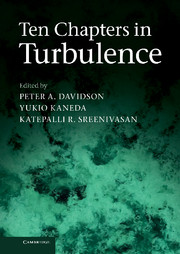Book contents
- Frontmatter
- Contents
- Preface
- Contributors
- 1 Small-Scale Statistics and Structure of Turbulence – in the Light of High Resolution Direct Numerical Simulation
- 2 Structure and Dynamics of Vorticity in Turbulence
- 3 Passive Scalar Transport in Turbulence: A Computational Perspective
- 4 A Lagrangian View of Turbulent Dispersion and Mixing
- 5 The Eddies and Scales of Wall Turbulence
- 6 Dynamics of Wall-Bounded Turbulence
- 7 Recent Progress in Stratified Turbulence
- 8 Rapidly-Rotating Turbulence: An Experimental Perspective
- 9 MHD Dynamos and Turbulence
- 10 How Similar is Quantum Turbulence to Classical Turbulence?
- References
1 - Small-Scale Statistics and Structure of Turbulence – in the Light of High Resolution Direct Numerical Simulation
Published online by Cambridge University Press: 05 February 2013
- Frontmatter
- Contents
- Preface
- Contributors
- 1 Small-Scale Statistics and Structure of Turbulence – in the Light of High Resolution Direct Numerical Simulation
- 2 Structure and Dynamics of Vorticity in Turbulence
- 3 Passive Scalar Transport in Turbulence: A Computational Perspective
- 4 A Lagrangian View of Turbulent Dispersion and Mixing
- 5 The Eddies and Scales of Wall Turbulence
- 6 Dynamics of Wall-Bounded Turbulence
- 7 Recent Progress in Stratified Turbulence
- 8 Rapidly-Rotating Turbulence: An Experimental Perspective
- 9 MHD Dynamos and Turbulence
- 10 How Similar is Quantum Turbulence to Classical Turbulence?
- References
Summary
Introduction
Fully developed turbulence is a phenomenon involving huge numbers of degrees of dynamical freedom. The motions of a turbulent fluid are sensitive to small differences in flow conditions, so though the latter are seemingly identical they may give rise to large differences in the motions.1 It is difficult to predict them in full detail.
This difficulty is similar, in a sense, to the one we face in treating systems consisting of an Avogadro number of molecules, in which it is impossible to predict the motions of them all. It is known, however, that certain relations, such as the ideal gas laws, between a few number of variables such as pressure, volume, and temperature are insensitive to differences in the motions, shapes, collision processes, etc. of the molecules.
Given this, it is natural to ask whether there is any such relation in turbulence. In this regard, we recall that fluid motion is determined by flow conditions, such as boundary conditions and forcing. It is unlikely that the motion would be insensitive to the difference in these conditions, especially at large scales. It is also tempting, however, to assume that, in the statistics at sufficiently small scales in fully developed turbulence at sufficiently high Reynolds number, and away from the flow boundaries, there exist certain kinds of relation which are universal in the sense that they are insensitive to the detail of large-scale flow conditions. In fact, this idea underlies Kolmogorov's theory (Kolmogorov, 1941a, hereafter referred as K41), and has been at the heart of many modern studies of turbulence. Hereafter, universality in this sense is referred to as universality in the sense of K41
- Type
- Chapter
- Information
- Ten Chapters in Turbulence , pp. 1 - 42Publisher: Cambridge University PressPrint publication year: 2012
References
- 4
- Cited by



